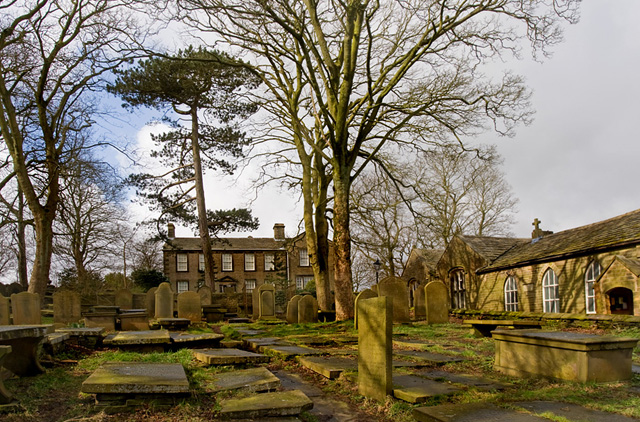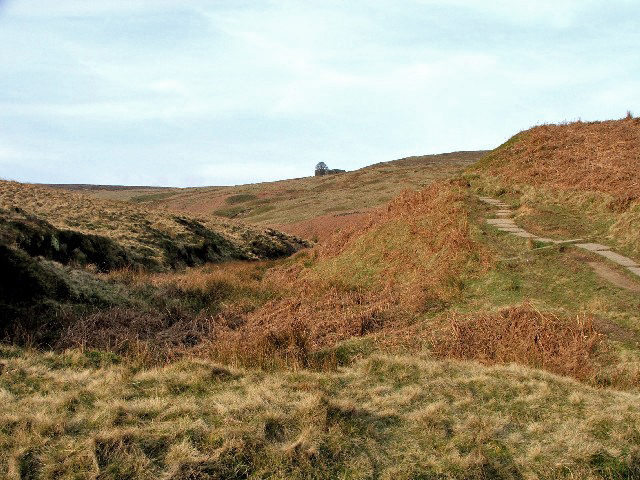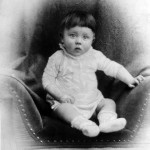
https://commons.wikimedia.org/wiki/File:CBRichmond.jpg
The front door and windows of the old Brontë parsonage look out over the wooded cemetery to the east, where the rising sun is hidden by the austere bulk of the church; behind the parsonage the moors rise up dark against the western sky. The rooms within are small and dim. It is hard to imagine writing there, and yet within those rooms the Brontë children read copiously, wrote abundantly, concocted their own shared imaginary world of fantasy and intrigue, created tiny newspapers illustrated with pictures so minuscule, they are better viewed with a magnifying glass. Only Branwell Bronte had a room of his own; his sisters were obliged to share their space with him and with one another. They sat together in the dining room in the evenings, taking turns reading aloud from their respective works, and pacing round the table as they did so. Their father, heading for bed, would call to them to remember to put the candles out.
Virginia Woolf famously stated that a woman needs a room of her own in order to write, but the tragic fact of Charlotte Brontë’s life was that she did not have such a room of her own until all of her siblings had died; after which Charlotte still paced around the dining table, reading aloud, but only to ghosts and memories, and maybe to God.
The space in the village of Haworth where Charlotte lived and worked, and eventually died, is hemmed in on all sides. Trees, walls, church, gravestones loom up to block one’s view.
Image credit: The_Bronte_Parsonage_-_geograph.org.uk_-_922570.jpg Copyright Dave Green and licensed for reuse under this Creative Commons Licence.
But take the narrow path past the parsonage, along the hillside, out of the village, onto the moors, and everything changes: here the sky goes on forever, the horizons seem nearly infinite. The moors are dense with heather, lumpy underfoot, dotted with little springs and rills, sometimes sinking down to bogland, or rising up in stony crags, rolling on into misty remoteness. On the moors one has all the space one could hope for, Wordsworth’s “bliss of solitude”, with only the cry of the curlew, or the strange warbling of the woodcock, which sounds like the probe droid from Star Wars, except that the Brontë sisters would not have thought that.
In the nineteenth century it was common belief that a woman’s place was in the home. Poet Laureate Robert Southey merely repeated popular prejudice in his response to Charlotte’s letter asking advice on writing: “Literature cannot be the business of a woman’s life, and it ought not to be. The more she is engaged in her proper duties, the less leisure will she have for it even as an accomplishment and a recreation. To those duties you have not yet been called, and, when you are, you will be less eager for celebrity. You will not seek in imagination for excitement, of which the vicissitudes of this life, and the anxieties from which you must not hope to be exempted, be your state what it may, will bring with them but too much.” Happily for us all, Charlotte did not take his counsel to heart.
The common feminist reading of Charlotte Brontë’s life and work is that she defied the male authorities of her day, both civil and religious, setting up a private sensual mythos of her own. Why be confined to the domestic tranquility of a house, when one can “seek in imagination for excitement” on the moors? To walk in Charlotte’s path is to discover the intoxicating freedom of escape, escape from the parsonage and from Haworth, escape from societal convention, realizing the puniness of mere human power in the midst of nature’s grandeur. Charlotte, like her most famous creation, Jane Eyre, was small and plain, seemingly demure, but she could write a fiery sentence:
“Conventionality is not morality. Self-righteousness is not religion. To attack the first is not to assail the last. To pluck the mask from the face of the Pharisee, is not to lift an impious hand to the Crown of Thorns.”
“It is in vain to say human beings ought to be satisfied with tranquillity: they must have action; and they will make it if they cannot find it. Millions are condemned to a stiller doom than mine, and millions are in silent revolt against their lot. Nobody knows how many rebellions besides political rebellions ferment in the masses of life which people earth. Women are supposed to be very calm generally: but women feel just as men feel; they need exercise for their faculties, and a field for their efforts, as much as their brothers do; they suffer from too rigid a restraint, to absolute a stagnation, precisely as men would suffer; and it is narrow-minded in their more privileged fellow-creatures to say that they ought to confine themselves to making puddings and knitting stockings, to playing on the piano and embroidering bags. It is thoughtless to condemn them, or laugh at them, if they seek to do more or learn more than custom has pronounced necessary for their sex.”
“I do not think, sir, you have any right to command me, merely because you are older than I, or because you have seen more of the world than I have; your claim to superiority depends on the use you have made of your time and experience.”
“I care for myself. The more solitary, the more friendless, the more unsustained I am, the more I will respect myself.”
Charlotte was critical of the ministers of the faith, in both her fiction and her personal remarks. Though she did eventually marry a curate herself, her representations of churchmen are not affectionate: in Shirley they appear as idle drunkards, in Jane Eyre as uptight authoritarians. She wrote to her publisher: “I love the Church of England. Her Ministers indeed, I do not regard as infallible personages, I have seen too much of them for that–but to the Establishment, with all her faults–the profane Athanasian Creed excluded–I am sincerely attached.” Many critics, such as John Maynard, see such avowals of orthodoxy as just a cover, however, since she was already in enough trouble simply for being a woman writer of “unwomanly” works. Sandra Gilbert and Susan Gubar argue that the point of the ending of Jane Eyre, the insertion of St. John’s letter from the mission fields, is ironically to undercut the evangelical zeal of her straitlaced former suitor, as Jane subtly exchanges the celestial paradise of the Christian mythos with a natural paradise of sensuality.
“My Master…has forewarned me. Daily He announces more distinctly, ‘Surely I come quickly!’ and hourly I more eagerly respond, ‘Amen, even so come, Lord Jesus.”
It is a statement that invokes both religious and sexual imagery, indeed. And I think it would be a mistake to discard either the sexual or the religious components of Charlotte’s work. Critics who read her as replacing religion with sex fail to see how central religion is for her female characters precisely in their pursuit of freedom. Shirley dares to interpret scripture on her own, taking possession of the right to understand divine things, as a guard against male authority. In Villette, Lucy Snow seeks meaning and form for her life through religious dialogue and engagement. Jane Eyre, having learned a “another creed,” a Christianity of hope, from Helen Burns, can turn to God when in distress, when facing loneliness, and as an ally against Rochester’s passionate assaults. She is able to leave him because she trusts in God’s love for her, and in God’s care for him.
It is curious, also, that after Jane has cried out in anguished prayer and at first received no answer, that night she has a kind of vision:
“…then, not a moon, but a white human form shone in the azure, inclining a glorious brow earhtward. It gazed and gazed on me. It spoke to my spirit; immeasurably distant was the tone, yet so near, it whispered to my heart –
‘My daughter, flee temptation.’
‘Mother, I will.’
The reader is left to muse on whether this is her own dead mother speaking to her, or mother nature – for later she refers to nature as her mother. Or is it the Mother God to whom she speaks? Charlotte is craftier than critics such as Virginia Woolf realize. She leaves so much for her readers to wonder at, so many little clues and hints that what she is proposing is far more radical than what conventional Anglicanism would allow. And far more radical than any mere sensual paradise.
The term “feminist” was not invented yet, in Charlotte Brontë’s day, but I will permit myself this anachronism, and say that in both her life and her work she was a pioneer of Christian feminism. She was able to stand staunch in defense of her own vocation and integrity, against the human conventions of society and its religion, because she put her faith in God, who loves and sustains creation – the God she found in what I dare to call the sacramentality of nature, out in the free open spaces where the soul could soar. A room of one’s own is good, but a moor of one’s own is even better.
Image credit: The Climb to Top Withins. Copyright Steve Partridge and licensed for reuse under this Creative Commons Licence. http://www.geograph.org.uk/photo/393405
In her works we see her female characters claiming a self-ownership precisely through groundedness in religion, a self-ownership lacking in secular feminist milestone works such as The Golden Notebook. Though she harbored some anti-Catholicism, typical of her day, and connected with her antipathy to European cultures, I can extend an ecumenical hand of gratitude backwards, across the generations, thanking her for her courage and conviction, for her daring novels, for showing us the possibilities for female fortitude and dignity when liberation from the constructs of a patriarchal culture is made possible through love and worship of a God who is, remarkably, a woman’s ally and defender.














